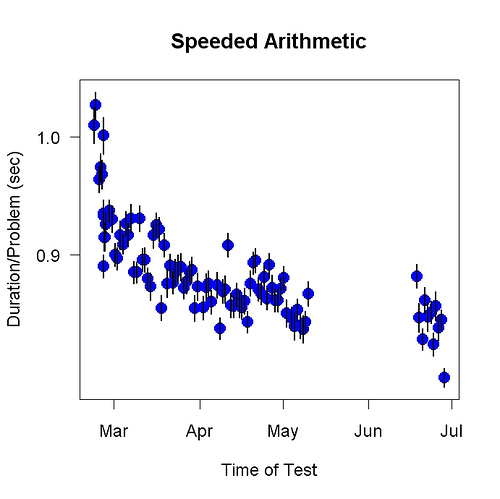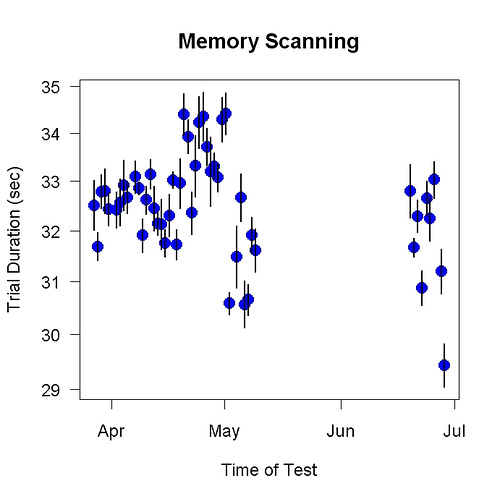I have always stopped self-experimenting when I travel because so much changes. Surely I will sleep differently, etc., far from home. However, it is not so obvious my arithmetic speed (how fast I do arithmetic problems such as 6 + 3) will change. I am measuring arithmetic speed as part of my study of omega-3 (directory).
I recently spent a week in Los Angeles. For the first time I continued self-experimentation while traveling. When I arrived I bought a bottle of flaxseed oil. I continued to take 4 T/day and did the same mental-function tests I do at home: arithmetic, memory-scanning, and balance. I have described these tests in other posts.
My balance was much worse in Los Angeles, apparently because what I see during the test changed (because the floor and other surroundings are different). I hadn’t realized how much that mattered. My arithmetic and memory-scanning results were roughly the same as the results at home — that is, until the last day. This graph shows arithmetic speeds:

This graph shows memory-scanning results:

The sudden improvement on the last day — also clear in the balance test — was a big surprise. It was too large to be due to practice, nor could it be due to being in LA — the previous 5 measurements were also in LA. It did, however, have a ready explanation: The previous night I had gotten back late and had forgotten to take the oil. So instead of taking 4 T at 11 pm I took it at 7 am. I did the tests at about noon. Instead of 8 or 9 hours between oil ingestion and test, in this case the difference was 5 hours.
If this explanation is correct, there is a short-lived effect of flaxseed oil on brain function — present 5 hours after ingestion but absent or weaker 8 hours later. Which, as a scientist, makes me say “Wow!” If this effect exists, it’s a new tool, the most precious and powerful thing in science. I can use it to compare amounts of flaxseed oil, oils (e.g., fish oil), and foods (e.g., salmon).
My current way of measuring omega-3 effects requires one/day tests repeated for weeks. When I reduced the amount of flaxseed oil I was taking from 4 T/day to nothing, it took more than a day with the lower dose before performance even went down, and many more days before performance stabilized. This meant that experiments had to last several weeks. If the new effect exists, it will allow much faster experiments.
4 tablespoons / day is a high dose. Do you take extra antioxidants?.
From which dose do you start to notice balance improvement?. I need to have a reference to give flax oil to an old person with balance problems. I will post results if I can convince this person to take it.
Thanks.
I noticed balance improvement with a much lower dose. I suggest starting with 1 Tablespoon/day.
I take a multi-vitamin pill that contains, among other things, vitamin A and vitamin C.
I recently read in an article that drinking flaxseed oil increases one’s risk of prostate cancer. The article states that the risk can be avoided by eating actual flaxseeds.
Does the risk of prostate cancer have a strong scientific basis? and are there any disadvantages of eating flaxseeds as opposed to drinking flaxseed oil?
Thanks. I think you could increase your intake of antioxidants like vitamin E, selenium, etc. I read (Pelton´s book) that high Omega 3 intake requires adecuate antioxidants.
On the subject of fatty acids and creativity, have you read this article (I don´t remember where I found it mentioned that caused me to download it, maybe here)?:
Psychoses and creativity:is the missing link a biological mechanism
related to phospholipids turnover?
Bradley S.Folley*,Mikisha .Doop,Sohee Park
Department of Psychology, Vanderbilt University, 301 Wilson Hall, 111 21st Ave. South, Nashville, TN 37240, USA
Horrobin has suggested [3 ]that evolutionary brain
changes occurring 2 million years ago coincided with the
appearance of both psychoses and creativity,and that
creativity and psychoses-proneness have made us truly
human.Elements of both psychotic thoughts and
creative thinking occur in all humans at some time;
indeed there is a continuum attributable to both of these
states suggesting that all humans are capable of
psychotic thinking and creative problem-solving.If
these elements can be ***related to changes in dietary fat
intake***,then it is also possible to assume that alterations
in catecholamine neurotransmitter function mechanisms
may have evolved as well.
I don’t know if flaxseed oil increases the risk of prostate cancer. An excellent just-published article (that I will describe in an upcoming post) implies that omega-3 fats decrease the risk of colorectal cancer — and therefore presumably all cancers.
I take selenium in addition to the other antioxidants I listed.
you can take flax seed oil with lignans, which, i understand eliminates the cancer risk.
yeah, the author of the article noted that the potential increase risk stemmed from most flaxseed oil’s lack of lignans.
eating actual seeds sounds like its more difficult to deal with than oil. and I bet that oil enters one’s system more effectively than eating seeds.
i’m afraid i wasn’t clear. you can buy flax seed oil that contains high lignan in the oil, so you don’t have to eat the flax seeds separately. You have to check the label for “high lignans” (if you do decide to eat flax seeds separately they must be ground up to release, among other things, lignans. If you eat flax seeds whole -without grinding- it will likely just pass thru you system. you can use a coffee grinder to grind the seeds. i purchase a Krup, which is effective and wasn’t too much $$$)